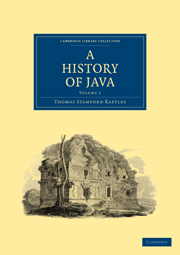Book contents
- Frontmatter
- Preface
- Preface
- Contents
- LIST OF PLATES IN VOLUME I
- Java first visited by the Portuguese
- CHAPTER I
- CHAPTER II
- CHAPTER III
- CHAPTER IV
- CHAPTER V
- CHAPTER VI
- CHAPTER VII
- CHAPTER VIII
- AN ANALYSIS OF THE BRÁTA YÚDHA, OR HOLY WAR, OR RATHER THE WAR OF WOE: AN EPIC POEM, IN THE KÁWI OR CLASSIC LANGUAGE OF JAVA
- Plate section
- Frontmatter
- Preface
- Preface
- Contents
- LIST OF PLATES IN VOLUME I
- Java first visited by the Portuguese
- CHAPTER I
- CHAPTER II
- CHAPTER III
- CHAPTER IV
- CHAPTER V
- CHAPTER VI
- CHAPTER VII
- CHAPTER VIII
- AN ANALYSIS OF THE BRÁTA YÚDHA, OR HOLY WAR, OR RATHER THE WAR OF WOE: AN EPIC POEM, IN THE KÁWI OR CLASSIC LANGUAGE OF JAVA
- Plate section
Summary
Importance of agriculture to Java
The island of Java is a great agricultural country; its soil is the grand source of its wealth. In its cultivation the inhabitants exert their chief industry, and upon its produce they rely, not only for their subsistence, but the few articles of foreign luxury or convenience which they purchase. The Javans are a nation of husbandmen, and exhibit that simple structure of society incident to such a stage of its progress. To the crop the mechanic looks immediately for his wages, the soldier for his pay, the magistrate for his salary, the priest for his stipend (or jákat), and the government for its tribute. The wealth of a province or village is measured, by the extent and fertility of its land, its facilities for rice irrigation, and the number of its buffaloes.
When government wishes to raise supplies from particular districts, it does not enquire how many rupees or dollars it can yield in taxes, but what contribution of rice or maize it can furnish, and the impost is assessed accordingly: the officer of revenue becomes a surveyor of land or a measurer of produce, and the fruits of the harvest are brought immediately into the ways and means of the treasury. When a chief gives his assistance in the police or the magistracy, he is paid by so much village land, or the rent of so much land realized in produce; and a native prince has no other means of pensioning a favourite or rewarding a useful servant.
- Type
- Chapter
- Information
- A History of Java , pp. 106 - 162Publisher: Cambridge University PressPrint publication year: 2010First published in: 1817



